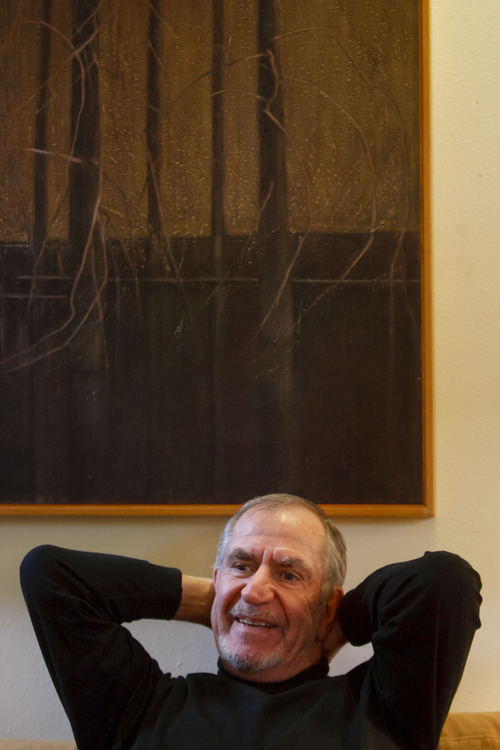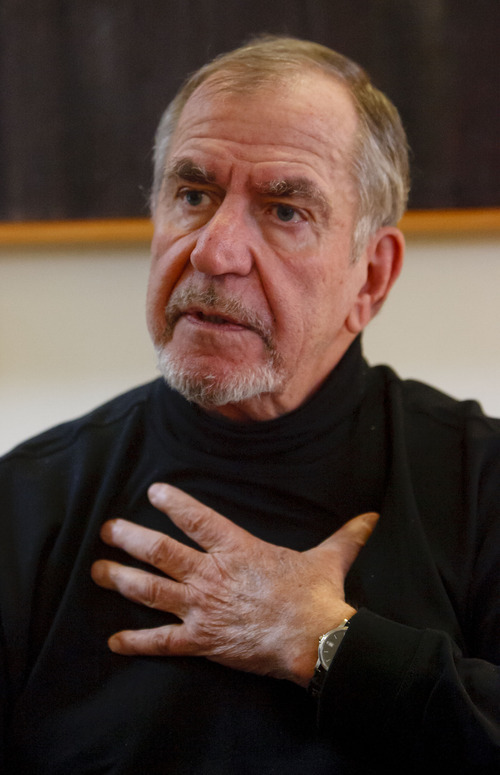This is an archived article that was published on sltrib.com in 2011, and information in the article may be outdated. It is provided only for personal research purposes and may not be reprinted.
With more than 40 plays to his name, David Kranes most certainly qualifies as a professional playwright.
To paraphrase one of William Shakespeare's most famous lines, however, the play's not always "the thing." Be it painting, architecture, prose or even dance, Kranes' consciousness is caught by so many other passions on the way to his next project as playwright.
With its endless rounds of losing and winning, a Nevada casino floor becomes a vast repository of real-life drama. The paintings of Lucian Freud and Edward Hopper can hold as many lessons for theater students as Henrik Ibsen. And space itself can be arranged for dramatic effect equal to that of musical instruments.
In the authorial universe of Kranes, professor of English at the University of Utah turned emeritus after his 2001 retirement, the world is full of too many wonderful things to concentrate on plays alone. It's just that, even with seven novels and two short-story collections, his creative offspring take the form of plays more often than not.
"In Europe, writers are writers," Kranes wrote in an e-mail before an in-person interview at his Salt Lake City home. "Camus and Sartre wrote philosophy, novels, plays, journals, essays. They were thinkers who crafted their thoughts and feelings into words and placed those words in what felt to them to be the most appropriate containers. … I'm not sure why most American writers work as specialists, but they do."
Given his prodigious output and breakneck work ethic—the 74-year-old's next big project is a detective novel set in Las Vegas—it's perhaps no surprise that Kranes forgot to get his most choice plays published. His plays always found a stage, to be sure. Several have been published as part of anthologies, but never as a stand-alone collection that stood as testament to his singular talent. So Jon Tuttle, a student of Kranes at the U. of U. in the early 1980s and now English professor at South Carolina's Francis Marion University, did the legwork for him.
Published this summer by San Diego's Level 4 Press, David Kranes Selected Plays contains "Salmon Run" and "Cantrell," first performed 1984 and 1988 respectively at Salt Lake Acting Company; "Future Tense," which debuted 1981 at Louisville's Annual Festival of New American Plays; and "House, Bridge, Fountain, Gate," which premiered at New York City's Lark Theatre in 2001.
Also included is "Nevada," a play as expansive and far-reaching as the Silver State sky, and one that set a tone of sorts for Kranes' signature style of dramatic writing, not to mention his abiding interest in all things gambling. The story of two couples' struggles with life and relationships in a small, border-town casino, it's meticulously specific in its set design and instructions—reflecting Kranes' lifelong interest in "dramaturgy of space." It's also rife with poetic dialogue in which his characters strive against the limits of language to capture the essence of connections and distances between people.
Tuttle wrote in an email that perhaps one reason Kranes' plays never found their way into a single collection is the significant demands they present when read alone.
"There are tensions, motivations, chronic angers or anxieties always lingering in the subtext, and the themes in the plays are woven in musically," Tuttle said. "Aristotelian plot line … is not what drives his plays. His plays are instead Ovidian: They transform. He gives us a condition which then deepens and changes and suddenly we realize how wonderfully our own responses have been choreographed and how we have been changed as well."
That same state of transformation has constituted a large part of Kranes' writing career. A Boston native until he moved to Salt Lake City to start teaching at the U. in 1967, he said he was held rapt by his first trip west across the Utah border into Nevada during a snowstorm on the Salt Flats, only to find himself in a casino moments later.
"[Casinos are] full of compressed drama; sometimes chilling, sometimes heartbreaking, sometimes quite wonderful," Kranes said.
Not content with a desk in the ivory tower of academia, he reported and wrote a 1991 article for a trade publication titled "Casino Space" that secured him years of consulting work for the gambling industry, forever looking for architectural configurations that will attract patrons.
As founder of the Sundance Playwrights' Lab, where he was artistic director for 14 years before leaving the post in 1987 to help create the WordBridge Playwrights Lab, Kranes has worked with rising talent by the score. One key to theater's future, he said, is an aesthetic that takes the art form out of the enclosed spaces currently popular with many playwrights.
"It's been 'compressionist' for too long, with all the drama set in small apartment rooms and such. It doesn't have vertical reach," Kranes said. "Theater began with people talking to the heavens and spirits of the underworld. Thanks to playwrights like Tony Kushner [author of "Angels in America"] it's opening up again. That's good."
Twitter: @Artsalt
Facebook.com/nowsaltlake —
David Kranes: Selected Plays
Edited by Jon Tuttle
Level 4 Press
Pages • 466
Price • $12.95











